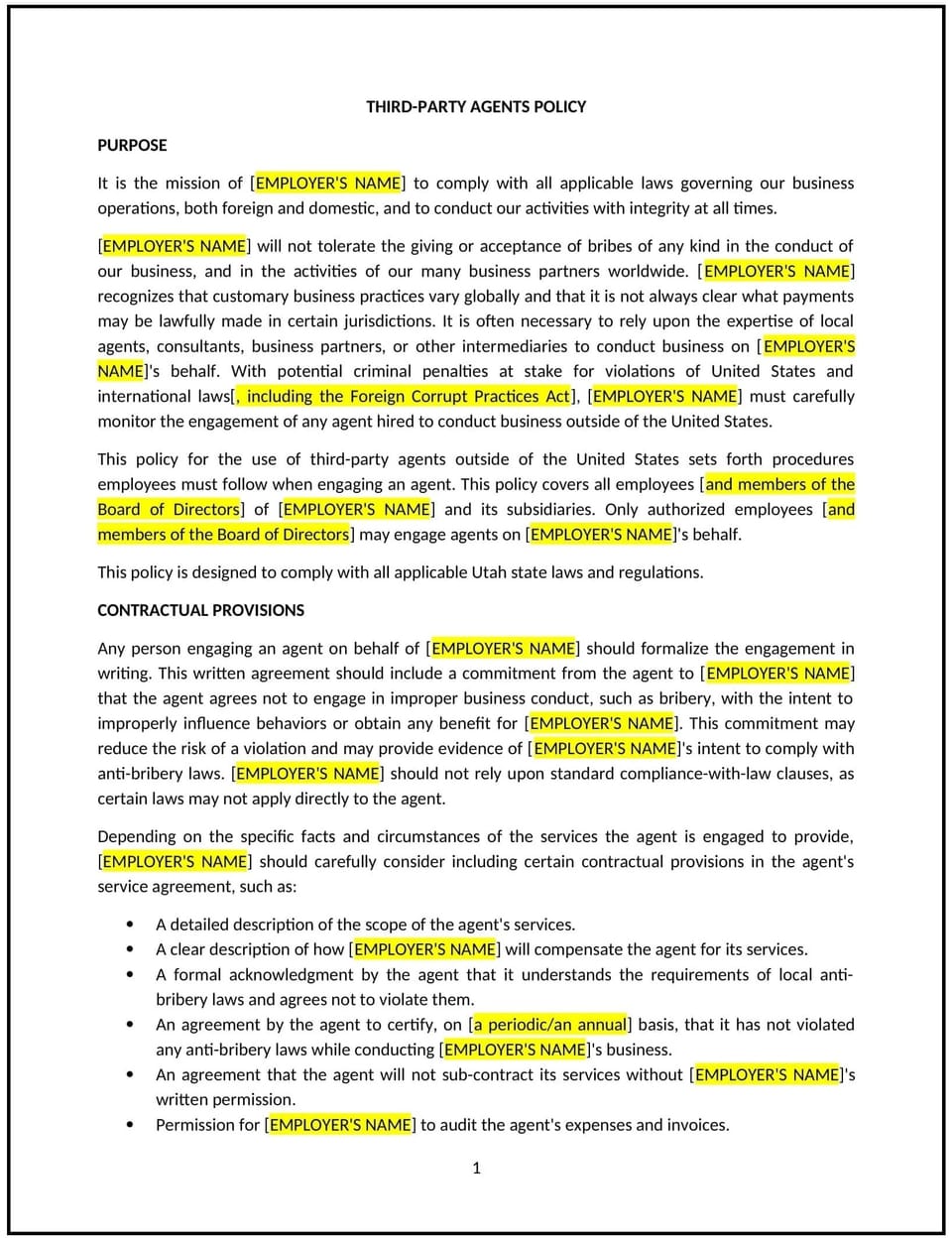Third-party agents policy (Utah): Free template

Third-party agents policy (Utah)
This third-party agents policy is designed to help Utah businesses establish guidelines for working with external vendors, contractors, or consultants. It outlines procedures for selecting, managing, and monitoring third-party agents to ensure compliance and protect the business’s interests.
By adopting this policy, businesses can reduce risks, maintain accountability, and align with general best practices for third-party relationships.
How to use this third-party agents policy (Utah)
- Define third-party agents: Explain what constitutes a third-party agent, such as vendors, contractors, or consultants.
- Establish selection criteria: Outline the process for selecting third-party agents, including due diligence and background checks.
- Address contracts: Specify the terms and conditions for working with third-party agents, including confidentiality and compliance requirements.
- Monitor performance: Provide guidelines for evaluating third-party agents’ performance and adherence to contracts.
- Ensure compliance: Align third-party relationships with federal and state laws, such as anti-corruption or data privacy regulations.
- Train employees: Educate employees on the policy and their responsibilities when working with third-party agents.
- Review and update: Assess the policy annually to ensure it aligns with evolving business needs and legal standards.
Benefits of using this third-party agents policy (Utah)
This policy offers several advantages for Utah businesses:
- Reduces risks: Ensures third-party agents meet the business’s standards and comply with legal requirements.
- Maintains accountability: Provides clear guidelines for managing and monitoring third-party relationships.
- Aligns with best practices: Offers a structured approach to working with external vendors or contractors.
- Protects interests: Minimizes the potential for disputes, fraud, or legal issues related to third-party agents.
- Enhances trust: Demonstrates a commitment to ethical and compliant business practices.
Tips for using this third-party agents policy (Utah)
- Communicate the policy: Share the policy with employees and include it in the employee handbook.
- Provide training: Educate employees on the policy and their responsibilities when working with third-party agents.
- Monitor compliance: Regularly review third-party relationships to ensure adherence to the policy.
- Address issues promptly: Take corrective action if third-party agents violate contracts or fail to meet performance standards.
- Update regularly: Assess the policy annually to ensure it aligns with evolving business needs and legal standards.
Q: How does this policy benefit businesses?
A: By managing third-party agents effectively, businesses can reduce risks, maintain accountability, and protect their interests.
Q: What types of third-party agents are typically covered?
A: Covered agents may include vendors, contractors, consultants, or other external service providers.
Q: How can businesses ensure third-party agents comply with contracts?
A: Businesses should conduct regular performance evaluations, monitor compliance, and enforce contract terms.
Q: What should businesses do if a third-party agent violates the policy?
A: Businesses should address the violation promptly, terminate the contract if necessary, and seek legal advice if applicable.
Q: How often should businesses review this policy?
A: Businesses should review the policy annually or as needed to ensure it aligns with evolving business needs and legal standards.
This article contains general legal information and does not contain legal advice. Cobrief is not a law firm or a substitute for an attorney or law firm. The law is complex and changes often. For legal advice, please ask a lawyer.


